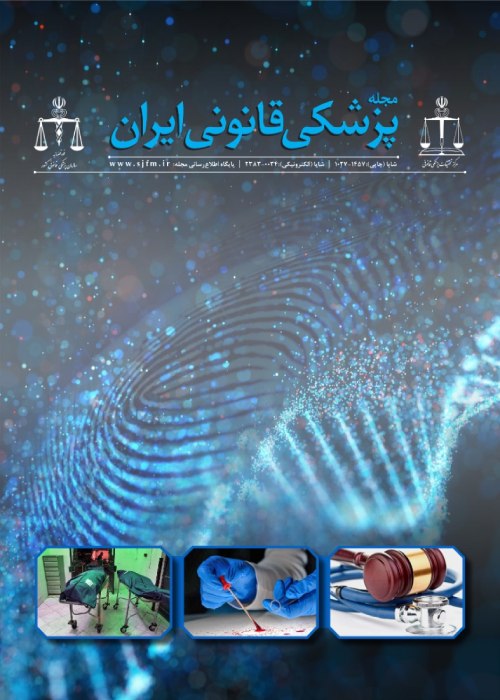Autopsy findings of brainstem in head trauma in comparison with CT scan findings in brain trauma ward, Imam Khomeini hospital, Tabriz
Author(s):
Abstract:
Background and Aim
Because of its ability to demonstrate the nature, extent, sites, and multiplicity of brain injury, computed tomography (CT) is now the primary diagnostic method for head trauma. Although there have been numerous reports on the CT findings of most types of intracranial injuries, the findings in brainstem injuries have not been well described. This study aimed at comparing the autopsy findings of brainstem in head trauma in comparison with CT scan results. Materials and Methods
Two hundred patients with head trauma, who expired after a period of time of hospitalization, were assessed in a diagnostic value study. Brain stem involvement was determined by autopsy as well as CT scanning of the brain during their hospitalization. The results of the two methods compared with each other, emphasizing the type and the location of probable lesions in the brain stem. Considering the autopsy as the method of the choice, sensitivity, specificity, positive predictive value (PPV) and negative predictive value (NPV) of CT scan in brain stem lesions of patients with head trauma were calculated. The effect of primary cause of head trauma, survival time and Glasgow coma scale (GCS) were evaluated, as well. Findings
Brain stem lesions detected in 39 (19.5%) patients in autopsy. However, CT scan revealed brain stem lesions in 23(11.5%) cases. The sensitivity, specificity, PPV and NPV of CT scan was 59%, 100%, 100% and 91% respectively. The most common lesions of the brain stem region were as contusion of pons (8.5%), medulla (5%) and midbrain (4.5%). There were 6 (3%) cases of pontomedullary junction tear and 1 (0.5%) case of cervicomedullary junction tear. Admitting GCS and survival time were significantly lower in patients with brain stem lesion (p<0.001 for both of them); however, the initial mechanism of trauma did not significantly differed between the two groups (p=0.343). Conclusion
CT scan is a specific method of evaluating patients with probable brain stem injuries after head trauma, but low sensitivity limits its efficacy. Our results are in conformity with the reports in the literature.Language:
Persian
Published:
Forensic Medicine, Volume:14 Issue: 2, 2008
Page:
99
magiran.com/p573330
دانلود و مطالعه متن این مقاله با یکی از روشهای زیر امکان پذیر است:
اشتراک شخصی
با عضویت و پرداخت آنلاین حق اشتراک یکساله به مبلغ 1,390,000ريال میتوانید 70 عنوان مطلب دانلود کنید!
اشتراک سازمانی
به کتابخانه دانشگاه یا محل کار خود پیشنهاد کنید تا اشتراک سازمانی این پایگاه را برای دسترسی نامحدود همه کاربران به متن مطالب تهیه نمایند!
توجه!
- حق عضویت دریافتی صرف حمایت از نشریات عضو و نگهداری، تکمیل و توسعه مگیران میشود.
- پرداخت حق اشتراک و دانلود مقالات اجازه بازنشر آن در سایر رسانههای چاپی و دیجیتال را به کاربر نمیدهد.
In order to view content subscription is required
Personal subscription
Subscribe magiran.com for 70 € euros via PayPal and download 70 articles during a year.
Organization subscription
Please contact us to subscribe your university or library for unlimited access!



